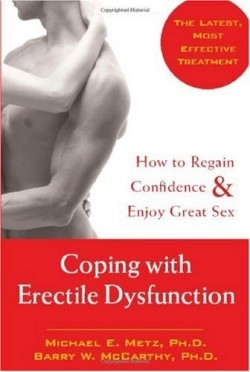Coping with Erectile Dysfunction
How to Regain Confidence & Enjoy Great Sex
The most important sex organ is the mind, insist these authors, both psychologists (affiliated with the University of Minnesota and American University, respectively). Well-respected authors, teachers, and practitioners of sex therapy, they assert, with plenty of evidence, that erectile dysfunction is a biopsychosocial problem, not simply a physical (bio) issue. The way men think (psycho) and relate to their partners (social) are elements of the story that get shortchanged in pharmaceutical advertising and in doctor’s offices.
The authors counter several widespread myths. For instance, three-fourths of men believe they are below average in genital size! This finding will delight spammers and quacks who sell useless remedies for imaginary ailments. Other fallacies that are debunked include the idea that penis size is related to virility and partner satisfaction; that Viagra always works; and that aging normally results in erectile dysfunction.
Metz and McCarthy differentiate youthful, “automatic” sex from mature, interpersonal sex. The Vieira myth, aided and abetted by Hollywood and Madison Avenue, makes older men feel disabled if they don’t pop up with excitement at any prospect of sex. In fact, most adults, and the vast majority of women of all ages, prefer gradual arousal in the context of a meaningful and mutual relationship. This is not a book for men who want “effortless and predictable erections 100 percent of the time.”
Metz is the author of the Styles of Conflict Inventory; McCarthy has written Sexual Awareness and Rekindling Desire. They counsel that even the new medications don’t guarantee sexual nirvana. “If you only take a pill, you gain no skill”, they warn. Their book includes not only a penis owner’s manual, but a guide to talking, relaxing, and touching; to female anatomy and psychology; and to a whole new rhythm of lovemaking based on leisurely enjoyment rather than a race to the peak.
Most men apparently find it easier to talk to a doctor than to their partners about sexual issues; this book helps couples engage in talking, sensible scheduling of relaxation, and specific exercises, which are carefully explained. A number of excellent case histories illustrate problems and solutions. There are guides to further reading, to videos for learning and stimulation, and to professional associations and therapists. For less than the cost of two pills, this book is a great investment.
Reviewed by
E. James Lieberman
Disclosure: This article is not an endorsement, but a review. The publisher of this book provided free copies of the book to have their book reviewed by a professional reviewer. No fee was paid by the publisher for this review. Foreword Reviews only recommends books that we love. Foreword Magazine, Inc. is disclosing this in accordance with the Federal Trade Commission’s 16 CFR, Part 255.

